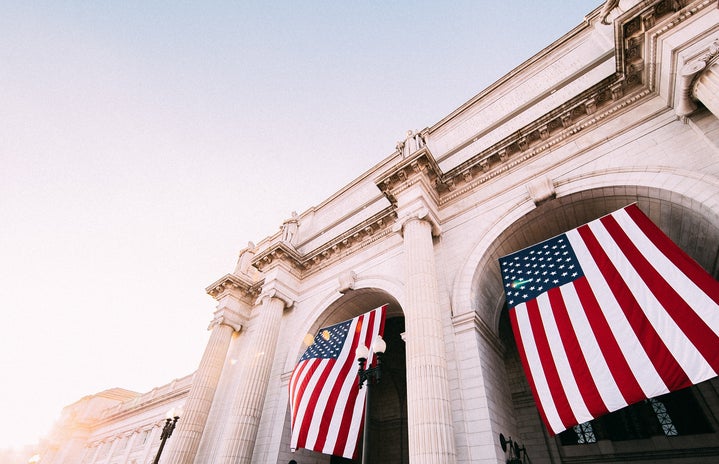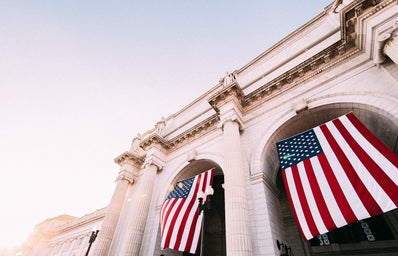Despite its relatively young age, the United States of America has quickly become one of the most advanced and prosperous nations in the world. As citizens, we are lucky to live in a nation with so many freedoms, rights and privileges, but this doesn’t mean we don’t have plenty of room for improvement. However, it will be pretty difficult to create positive change if we can’t look back at the history of our own country and view it for what it objectively was, including both the good and the bad. Examining past wrongdoings, especially ones as vile and dehumanizing as slavery and segregation, is no easy feat – but, no one ever said creating a true democracy would be easy.
It might be tempting to look back to times of slavery in the U.S. and see the progress we’ve made and claim that all of America’s wrongs have been righted, but that would just be naïve. If you actually took the time to examine the events that have occurred in between now and then, you’d notice that although we’ve made some strides, the playing field for black people in this country is by no means equal. You might be shaking your head in disagreement as you think of several successful black people that you know who have been able to uplift themselves despite living in a system that has historically oppressed them, but understand this: singular success stories of black people that you know or black celebrities do not erase the obstacles that stand between all black people and success in this country. Black people who are not able to get out of poverty are not lazy, unmotivated or less than. There is nothing wrong with black people in this country. There is something wrong with the systems in this country that have historically affected the way in which black people are able to function in society – and those systems, even if currently under reform, have caused generational trauma and harm that will take years to undo. It is the United States’ responsibility to help uplift black people after centuries of holding them back.
While introducing a reparations bill to the Senate back in 2019, New Jersey Senator Cory Booker said, “I feel a sense of anger where we are in the United States of America, where we have not had a direct conversation about a lot of the root causes of the inequities and the pain and the hurt manifested in economic disparities, manifested in health disparities, manifested in a criminal justice system that is indeed a form of new Jim Crow.” Although some people think of individual checks being placed in the hands of African-Americans when they hear the word “reparations,” that’s not quite accurate. In reality, reparations are investments in a variety of programs that will help create long-lasting economic success for black communities across the country through affordable housing, job training, better educational systems and criminal justice reform. In fact, Asheville, North Carolina passed a resolution earlier this year to study reparations and create an investment plan – and they don’t plan on raising taxes to do it!
If you’re still closed off to the need for reparations or significant policy change in this country, here are some facts that showcase both the history and the current state of black oppression in the United States of America.
Slavery helped the U.S. economy to grow, while it simultaneously destroyed the lives of African-Americans. According to historian David Blight, “In 1860, slaves as an asset were worth more than all of America’s manufacturing, all of the railroads, all of the productive capacity of the United States put together.” Slaves were America’s largest financial asset, and yet slaveowners held little regard for the well-being or happiness of their slaves. In fact, 50 years before emancipation, the government started sending freed slaves to the colony of Liberia – a decision that was made based on the belief that whites and blacks could never co-exist. However, most slaves did not want to leave the country they had been born in and had helped to establish, despite the fact that they knew by staying in the U.S. they would continue to be treated as less than human thanks to Jim Crow laws and segregation.
Voting is a right afforded to every American – except it was not always so with those who were not white male land owners. If a person or a group of people do not have the right to vote, then their interests will not be represented in government. African-Americans have only recently gained the right to vote, comparative to other groups in the United States; and even when it was deemed legal, there were many loopholes and barriers put in place to prevent African-Americans from voting. A Mississippi senator from the late 19th century, Theodore Bilbo, once said, “You and I know what’s the best way to keep the [racial slur] from voting,” in reference to lynching. This is an example of a governmental official suggesting that black people be murdered before they are allowed to vote. If this was happening just over one hundred years ago, then it is not an exaggeration to say that the legacy of voter suppression still exists today and prevents the interests of African-Americans from being protected by the United States government.
Owning property is crucial in the United States. It helps a person gain social status and it is often an indicator of income level. In the past, getting a mortgage as an African-American was nearly impossible thanks to redlining. The process of redlining created maps of major cities that were broken down into zones and given ratings. Neighborhoods with high minority populations almost always received the “hazardous” rating, which would make the individuals who lived in those areas ineligible to receive funding for a mortgage from the Federal Housing Administration. This means that not only could African-Americans not vote, but more often than not they did not own property. Building equity allows a person to gain wealth, and property is frequently passed down to future generations. If African-Americans could not pass down property to their children and could also not vote to change these discriminatory policies, then they were left disenfranchised, and thus behind their white counterparts.
Today, many economic and social disparities still exist between white and black people in this country thanks to the legacy of racist and discriminatory systems. According to Dr. Ibram X. Kendi, the Director of the Boston University Center for Antiracist Research, “For every $100 of wealth that white families hold, black families hold just $5. One in four black households has zero or negative wealth, in contrast to one in 10 white households. White households make up 96 percent of the top 1 percent, while black households constitute 2 percent of that highest wealth bracket.” These numbers are clear indicators of the barriers that prevent black people in America from gaining long-term economic success.
It is hard for many people in this country to admit that white supremacy could serve as an explanation for anything, but truthfully, this entire country was built upon the desire to uplift white people; so, after all African-Americans have endured in this country, reparations are deserved and long overdue. Ta-Nehisi Coates explains this delicate situation the best, writing, “To ignore the fact that one of the oldest republics in the world was erected on a foundation of white supremacy, to pretend that the problems of a dual society are the same as the problems of unregulated capitalism, is to cover the sin of national plunder with the sin of national lying.” Reparations would not further divide us or favor one group over another. And let’s be honest: could we as a nation become any more divided than we already are? Reparations serve to level the playing field, and this country would benefit from the success of all of its citizens, not just a select group’s success. It’s time to reconcile with America’s past wrongdoings and move forward in the hopes of creating a better nation. The United States’ history of racism and oppression isn’t up for debate. You may not be part of the problem, but what are you going to do to be part of the solution? We can’t slap affirmative action as a Band-Aid onto the wound of racism in America and simply turn our backs. It hasn’t worked, and it will continue to fail if we don’t take more serious measures.
If you are against the mere possibility of reparations, the mere possibility of justice where it is long overdue or the mere possibility of a more permanent and effective solution to the struggles of the black community in this country, then ask yourself this question: What do you have to lose from America becoming the country it originally set out to be – one where there is actually “liberty and justice for all?”



